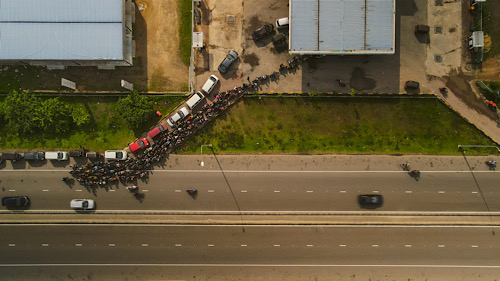Colombo open doors to foreign companies to stem fuel crisis
After the nationalisation by June, three oil companies will start distribution in 450 service stations out of the 1142 scattered on the island. Signatures are expected within days for China's Sinopec, Australia's United Petroleum, and the US-based Rm Parks Inc. The companies will be able to import, store and distribute products related to black gold for the next 20 years.
Colombo (AsiaNews) - Three foreign companies are ready to return to the Sri Lankan oil market, following Colombo's nationalisation of the crude sector in the early 1960s, with the sole exception of the Indian Oil Corporation (Ioc), which operated until 2003.
With this in mind, the government recently finalised agreements on fuel sales, logistics, management policies including the timing of the start of operations, in collaboration with the main local operator in the sector, the Ceylon Petroleum Corporation (Cpc).
Last month, the Council of Ministers approved a proposal to grant licences to three foreign oil companies, which will be able to sell crude oil in the domestic retail market. They are China's Sinopec, Australia's United Petroleum, and the US-based Rm Parks Inc., which will be able to operate in partnership with London-based Shell Plc. The companies will be able to import, store and distribute products related to black gold for the next 20 years.
Energy Minister Kanchana Wijesekera reports that the 'main agreements' will be signed in mid-May and operations can begin 'within 45 days of signing'. Officials from the ministry explain to AsiaNews that 'a year after the crisis' that forced citizens into long queues at the service areas, foreign companies will also enter the domestic market, which 'will be able to sell fuel at a lower price' than the one adopted by the state company today. The formalisation of the date should be forthcoming.
The Sri Lankan oil (and energy) market is being closely watched by China's Sinopec, so much so that a group of the company's executives is currently on the island to finalise agreements for the sale of crude oil.
According to the agreement, each company should be able to supply 150 service stations controlled by the Ceylon Petroleum Corporation. Currently, there are 1142 stations under the jurisdiction of the Cpc; however, the company owns only 234 of them in full, while another 450 out of the remaining 908 are owned by private distributors and should be allocated to foreign companies.
Nishantha Gunaratna and Dasun Sudasinghe, Sri Lankan economic experts, attack the Cpc, describing it as a 'corrupt organisation, a loss-making entity and a burden on the national economy'. Hence the choice of privatisation, which appears to be 'the only possible solution', as is also reflected in public opinion.
Other industry scholars say that with the entry of three foreign companies, the presence of a 'state regulator' appears increasingly 'vital' to achieve 'the expected positive results'. Former Energy Minister Patalee Champika Ranawake is of the opinion that 'the government and the regulator should not allow the formation of energy cartels' also because by liberalising the fuel market 'the logic of competition should prevail' with the control of a third party body, otherwise it will be another 'disastrous experience' that would add to the current one of nationalisation.
26/08/2021 11:58
10/06/2021 12:16
19/01/2005







.png)










